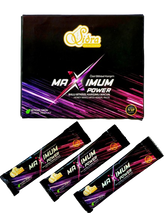Vitamin D Foods – Complete Guide to Natural Sources and Benefits
Vitamin D is one of the most essential nutrients for the human body. It plays a vital role in strengthening bones, supporting immunity, and improving mood. While sunlight is the most natural source of Vitamin D available at taaqatwar.pk, many people still face deficiency due to lifestyle, weather, or limited outdoor exposure. To overcome this, adding Vitamin D-rich foods to your diet is crucial. In this article, we’ll cover the best natural Vitamin D foods, their benefits, and how to include them in your daily routine.
Why Vitamin D is Important

Vitamin D, also known as the “sunshine vitamin,” helps the body absorb calcium and phosphorus, two minerals that keep bones and teeth strong. It also supports muscle function, boosts immunity, and may even play a role in reducing the risk of chronic diseases. Deficiency can lead to fatigue, weak bones, depression, and frequent infections.
Top Vitamin D Foods
Fatty Fish
Fatty fish like salmon, mackerel, sardines, and tuna are among the richest natural sources of Vitamin D. Just one serving of salmon can provide more than the daily requirement.
Egg Yolks
Egg yolks contain a good amount of Vitamin D along with protein and healthy fats. Adding eggs to your breakfast can help improve Vitamin D intake.
Mushrooms
Mushrooms naturally produce Vitamin D when exposed to sunlight. Varieties like maitake and shiitake are especially rich in this nutrient.
Fortified Foods
Many foods are fortified with Vitamin D, such as milk, orange juice, breakfast cereals, and plant-based alternatives like soy milk and almond milk.
Cod Liver Oil
Cod liver oil is a traditional supplement that is extremely high in Vitamin D. A single teaspoon can fulfill the daily recommended intake.
Cheese
Certain types of cheese, especially ricotta, contain moderate amounts of Vitamin D along with calcium, making them a good option for bone health.
Beef Liver
Though not commonly consumed, beef liver is rich in Vitamin D, Vitamin A, and iron, making it highly nutritious.
Benefits of Vitamin D Foods
Stronger Bones and Teeth
Vitamin D supports calcium absorption, preventing conditions like osteoporosis and rickets.
Improved Immunity
It helps the body fight infections, viruses, and inflammation.
Better Mood and Mental Health
Low Vitamin D levels are linked with depression and fatigue. Eating Vitamin D-rich foods can improve mood and energy.
Supports Heart and Muscle Health
Vitamin D plays a role in maintaining cardiovascular health and strong muscles.
Reduces Risk of Deficiency
A balanced diet with Vitamin D foods ensures long-term health and prevents deficiency symptoms.
Recommended Daily Intake of Vitamin D
-
Adults: 600–800 IU per day
-
Children: 400–600 IU per day
-
Elderly: Up to 1000 IU per day
The exact requirement may vary based on age, lifestyle, and medical conditions.
Who Needs More Vitamin D?
-
People who live in areas with limited sunlight
-
Elderly individuals with weaker bones
-
Vegetarians and vegans (since most Vitamin D foods are animal-based)
-
People with darker skin tones
-
Individuals with certain medical conditions affecting nutrient absorption
Tips to Boost Vitamin D Naturally
-
Spend 15–20 minutes in sunlight daily
-
Include Vitamin D foods in every meal
-
Pair Vitamin D-rich foods with healthy fats for better absorption
-
Use fortified products if natural sources are limited
-
Consider supplements if recommended by a doctor
Conclusion
Vitamin D foods are essential for maintaining strong bones, a healthy immune system, and overall well-being. While sunlight remains the best natural source, adding foods like fatty fish, eggs, mushrooms, fortified products, and cod liver oil can significantly improve Vitamin D levels. Consistency is key, so include these foods in your diet regularly for long-term health benefits.


